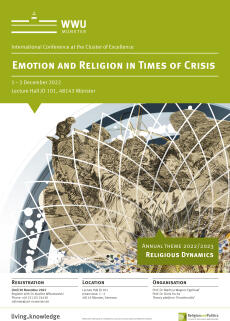“Times of crisis ignite emotions in and around religion”
Cluster of Excellence examines the complex relationship between emotion and religion – Case studies ranging from the Thirty Years’ War to hate speech and climate change – International conference with literary scholar Martina Wagner-Egelhaaf and political scientist Doris Fuchs

Press release from 23 November 2022
Speaking in the run-up to an international conference on “Emotion and religion in times of crisis”, which will take place in Münster from 1-3 December, literary scholar Prof. Dr. Martina Wagner-Egelhaaf and political scientist Prof. Dr. Doris Fuchs from the Cluster of Excellence “Religion and Politics” at the University of Münster argue that times of crisis often ignite emotions in and around religion: “Climate change, pandemics and migration, for example, evoke feelings of threat and disadvantage, which in turn trigger existential questions of meaning and have repercussions for religious feelings, attitudes towards the world, and opinions about the religions of others”. The conference will use case studies from the past and present to discuss how religion and the religious become emotionalized in crises where political and ideological orientations lose their binding force. It will also deal with examples where religion itself becomes a factor and phenomenon of crisis.
According to Wagner-Egelhaaf and Fuchs, one example of religion itself becoming a phenomenon of crisis is the abuse of power and abuse scandals in the Christian churches. “They evoke a strong emotionalization in the public consciousness. The crisis of the churches due to a decline in membership and loss of prestige is contrasted by the perception of an increased political presence of religion worldwide – this increased political presence often being perceived as threatening. This is communicated and reinforced by images in the media”. The conference will bring together researchers from many disciplines, including German studies, Romance studies, religious studies, and the political and social sciences. The conference will discuss the complex relationship between emotion and religion as part of the third annual theme at the Cluster of Excellence: “Religious Dynamics”.
Examples: Thirty Years’ War, hate debates today
The conference will also look at current debates about hate. “We see an emotionalization in society that extends to hostility and rejection”, says Wagner-Egelhaaf, who is working at the Cluster of Excellence on a literary and cultural history of this emotion. “Ten years ago, we would not have called attacks on synagogues or refugee centres ‘hate crimes’, but ‘attacks’ or ‘acts of violence’”.
The academics cite the Thirty Years’ War (1618-1648) as a historical example: “Literature and the visual arts show in striking images how religion and emotion mixed in the violent political turmoil across Europe. Religion, the engine and trigger of the conflict, was thereby functionalized in such a way that people’s certainties of faith were questioned and challenged”. A case in point is also classical modernity, when scientific progress, industrialization, colonization, and the experience of the First World War broke open familiar European worldviews and allowed new religious aspirations beyond the official churches to appear. The conference will examine the role that emotions play in the dynamics of such processes, exploring the complex of emotions systematically and historically, and scrutinizing this complex with regard to processes of religious change.
A working group at the Cluster of Excellence is conducting research on the relationship between emotion and religion. This issue is important for the Cluster’s guiding question in its third funding phase, which is concerned with the role of religion as an engine of political and social change. The group’s starting-point is the view that emotions are always historically and culturally coded, shaping individual and collective images of self and other, exacerbating or reducing conflicts between groups, and enabling or preventing social bonds. The group is also examining rhetorical and aesthetic procedures and media used to represent emotion and religion in visual art, architecture, literature, religious texts, and cultures of debate.
Also important is terminology: ‘affect’, ‘emotion’ and ‘feeling’ each describe different dimensions when it comes to the relationship between individual and community. Similar to the understanding of the term in ancient rhetoric, modern theorizing sees in ‘affect’ an overwhelmingness that impacts on the formation of community and group. The term ‘emotions’ emphasizes the communicative aspect, while ‘feeling’ leads into the realm of the modern conception of the subject as it developed in the late 18th century. ‘Emotion’ also tends to be the term used in the cognitive sciences. (vvm/sca)

